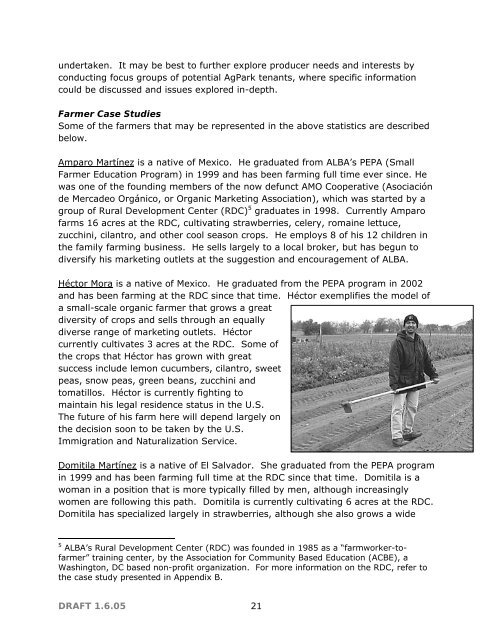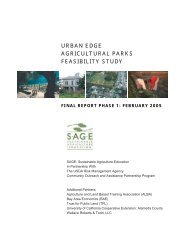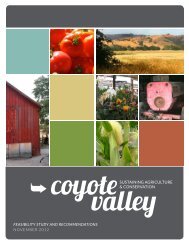A Feasibility Study for Urban Edge Agricultural Parks - SAGE
A Feasibility Study for Urban Edge Agricultural Parks - SAGE
A Feasibility Study for Urban Edge Agricultural Parks - SAGE
Create successful ePaper yourself
Turn your PDF publications into a flip-book with our unique Google optimized e-Paper software.
undertaken. It may be best to further explore producer needs and interests byconducting focus groups of potential AgPark tenants, where specific in<strong>for</strong>mationcould be discussed and issues explored in-depth.Farmer Case StudiesSome of the farmers that may be represented in the above statistics are describedbelow.Amparo Martínez is a native of Mexico. He graduated from ALBA’s PEPA (SmallFarmer Education Program) in 1999 and has been farming full time ever since. Hewas one of the founding members of the now defunct AMO Cooperative (Asociaciónde Mercadeo Orgánico, or Organic Marketing Association), which was started by agroup of Rural Development Center (RDC) 5 graduates in 1998. Currently Amparofarms 16 acres at the RDC, cultivating strawberries, celery, romaine lettuce,zucchini, cilantro, and other cool season crops. He employs 8 of his 12 children inthe family farming business. He sells largely to a local broker, but has begun todiversify his marketing outlets at the suggestion and encouragement of ALBA.Héctor Mora is a native of Mexico. He graduated from the PEPA program in 2002and has been farming at the RDC since that time. Héctor exemplifies the model ofa small-scale organic farmer that grows a greatdiversity of crops and sells through an equallydiverse range of marketing outlets. Héctorcurrently cultivates 3 acres at the RDC. Some ofthe crops that Héctor has grown with greatsuccess include lemon cucumbers, cilantro, sweetpeas, snow peas, green beans, zucchini andtomatillos. Héctor is currently fighting tomaintain his legal residence status in the U.S.The future of his farm here will depend largely onthe decision soon to be taken by the U.S.Immigration and Naturalization Service.Domitila Martínez is a native of El Salvador. She graduated from the PEPA programin 1999 and has been farming full time at the RDC since that time. Domitila is awoman in a position that is more typically filled by men, although increasinglywomen are following this path. Domitila is currently cultivating 6 acres at the RDC.Domitila has specialized largely in strawberries, although she also grows a wide5 ALBA’s Rural Development Center (RDC) was founded in 1985 as a “farmworker-tofarmer”training center, by the Association <strong>for</strong> Community Based Education (ACBE), aWashington, DC based non-profit organization. For more in<strong>for</strong>mation on the RDC, refer tothe case study presented in Appendix B.DRAFT 1.6.05 21





